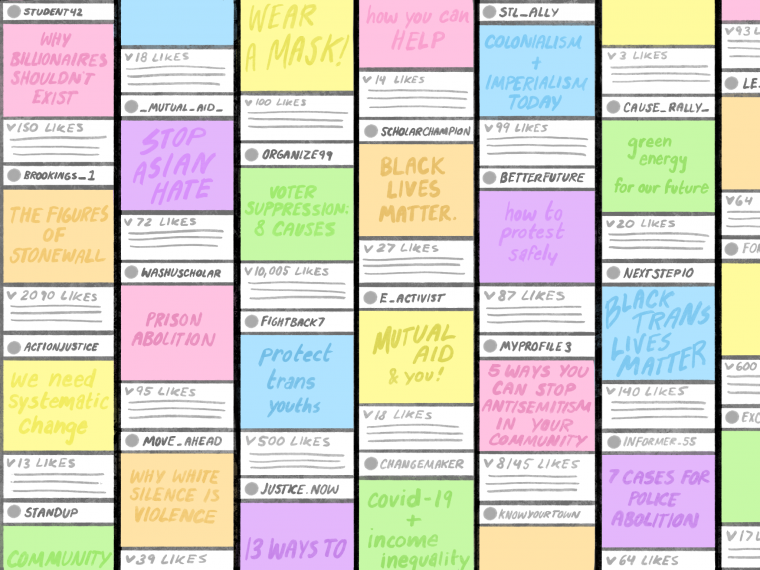Forum | Staff Columnists
Please, post that infographic
 HN Hoffmann
HN Hoffmann When George Floyd was murdered by police nearly a year ago, I thought, as I do every time a Black person is killed by the state, “My god, not again.” It was then that my social media feed was flooded by hundreds of informational posts in people’s Instagram stories, videos, reading lists and links in bio. It may sound strange, but this flood of reposts and links put into bios back in May actually made me feel a lot better, and since then, these re-posts have brought me comfort.
I’d like to preface by saying that this is contingent on the way my personal mental health works. I know a lot of people despise this—in fact, I know it makes many Black and brown people feel overwhelmed, isolated and furious beyond belief, and I understand that wholeheartedly. It is true: Posting is not enough, and it has never been enough. But as my friend, junior Jarea Fang, said in her article, “Op-Ed: The day after,” “I need you to share the infographics, donate to the funds, and go to the protests…Please, do this for me while I sleep. I’ll wake up and join you when I’m ready.”
Seeing so many of my followers posting every day, finding ways to spread the word about important racial issues, even in such a small way, made a difference. When I logged on to Instagram the day after George Floyd was murdered, I expected to feel alone—like no one in this world loved me, loved us, at all. But instead, I found people who were concerned, appalled and learning, and in such a vulnerable moment, that brought me comfort. If I had opened Instagram to an empty feed, it would have hurt so much more, the way it often does when most other Black people die at the hands of police. All this being said, posting videos or images of Black bodies being harmed is not included in this category. I still have not watched the video of George Floyd. I scroll past most videos when I see them. I refuse to watch because it hurts, but most of all, I do not need proof.
I say all of this with a few qualifiers. In tapping through stories and clicking links in people’s profiles, I only felt this assurance because I trusted many of my followers. I trusted that they had good intentions. And even if they didn’t, I trusted that they had followers who I didn’t know, followers who could never hear my voice, who would see an infographic and ponder it. Being honest, I tend to assume that most people are selfish, self-preserving and uncaring at heart. Even so, scrolling through reposts of infographics instead of new bikini pics, I knew that even if this was done out of fear or peer pressure or performatively following the norm, it meant something.
In high school, I was the only person in most of my classes who advocated for the racial issues I believed in. I was constantly being debated by several people at a time, inside and outside the classroom. This deeply affected my mental health and, frankly, it still does today. Learning another Black man died and seeing that it was not my personal responsibility to educate people for once, seeing that I did not have to push through the pain and speak out—it made me feel lighter, like I could take a break. And truthfully, that was invaluable to me then. Black people so often have to work through the mourning, and to have that as a sort of safety net really helped. Even in the smallest of ways, that support gives me the energy to grow stronger and be the advocate I want to be.
Reposting an infographic, whether or not you are posting for the “right reasons,” still spreads that information. For those who may be acting performatively—who have family members they don’t confront, allow friends to make racist remarks or say words they should not say while blasting music with their friends—the infographics are probably reaching people who are also more performative.
Someone once told me they were very hesitant to post anything about George Floyd because all of their followers shared their views, and so it wasn’t super important for them to post. This thought process is not only a bold assumption, but it also feels like a cop-out to me. I told them, verbatim, that I believed white people were more willing to listen to other white people about the issues BIPOC people face, so it was vital for them to post, even if they did think it wasn’t “doing anything.” They agreed. If the reason why you don’t post infographics about minority issues, make your views on social justice known or elevate important issues is because they aren’t directly aiding in the movement itself, then they aren’t reasons to me––they’re excuses.
